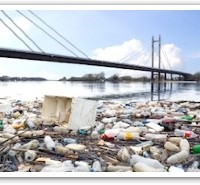P is for poison, by Roger Scruton
People poison themselves through consuming stuff that harms them. They also poison the world, by spreading venomous thought, venomous entertainment, and venomous waste. It is a strange feature of our societies that governments increasingly seek to control the first kind of poison, which threatens only the individual, while largely ignoring the second kind, which threatens us all. The reason for this lies in a deep disorder within democracies — namely the fear of moralizing, which leads legislators to order us about for the good of each of us, but never for the good of all.
We go a little way to understanding the matter if we consider the three great public poisons of our time, what they are doing to us, and why we find it so difficult to take action against them: political correctness, pornography, and plastic. The first poisons thought, the second poisons love, and the third poisons the world. Between them they put in question whether human life as we know it will survive, and whether it ought to survive, given what it will look like when the poisons have done their work.
Political correctness means soft censorship — censorship with penalties soft enough to be spread across us all. When people burned each other at the stake for uttering forbidden thoughts, they were also careful to draw a precise distinction between the forbidden and the permitted, so as to confine the danger. When the only penalty for uttering forbidden thoughts is to lose your job as a journalist, or your promotion in the academy, then the task of defining the forbidden area becomes less urgent. Moreover, for that very reason, the poison spreads rapidly through society, so that there is no longer any easy way to avoid it. When “homophobia” or “Islamophobia” are mere name-calling, without clear legal consequences for the victim, they can be used indiscriminately to ruin the career of whosoever might have stumbled, by whatever accident of fate, into the target area. When words become deeds, and thoughts are judged purely by their expression, and not by the arguments advanced in their favor, then there is no clear way of debating the issues of the day, however vital they might be. A universal caution invades the intellectual life; people mince their words, sacrifice style and grace for the clumsy armor of “inclusive” syntax, avoid all the areas where orthodoxies have taken root — sex, race, gender, religion, patriotism — and beat around bushes in which nothing hides.
It is thanks to political correctness that the academy has been overwhelmed by pseudo-scholarship. It is thanks to political correctness that the British government has adopted gay marriage as its policy, even though it never proposed this to the electorate. It is thanks to political correctness that a hospital worker can, in Britain, leave a patient unattended in order to say salat, but not perform his or her hospital duties while wearing a cross. In a hundred little ways our traditional forms of life are being censored out of existence. Every now and then there is a show trial conducted in order to remind the people of this, as when Larry Summers was driven from his position at Harvard for having dared to suggest that the brains of women are differently organized from the brains of men.
The poison of pornography has something in common with the poison of political correctness, namely that it is not noticed as a poison by those who promote it. The astonishing thing, indeed, is that American opinion formers have to be persuaded of the damage that pornography is inflicting. They have to be confronted with the overwhelming body of research, well known to the psychological community and in any case no more than common sense, which shows that porn is addictive, destructive of sexual confidence, undermining of sexual relations, and promoting of an entirely abusive and objectified view of women in particular and human beings in general. Not only is porn driving all romance and hesitation from the expression of sexual desire; it is reconfiguring that desire, so that it is no longer a free gift between persons but a form of enslavement.
It is right to see porn as a poison, because its effects cannot be confined. The addiction is only the smallest part of it. Far worse is the destruction inflicted on the emotional life and on the capacity to love. A difficult discipline, on which the future of society depends, and to which previous generations devoted all that was best in their nature, is being placed beyond the reach of young people. And as a result their emotional lives are increasingly disordered. (If you don’t believe this, then you must read the definitive account in James Stoner and Donna Hughes, The Social Costs of Pornography, Princeton, Witherspoon Institute, 2010.)
Read the complete article in Catholic Education
